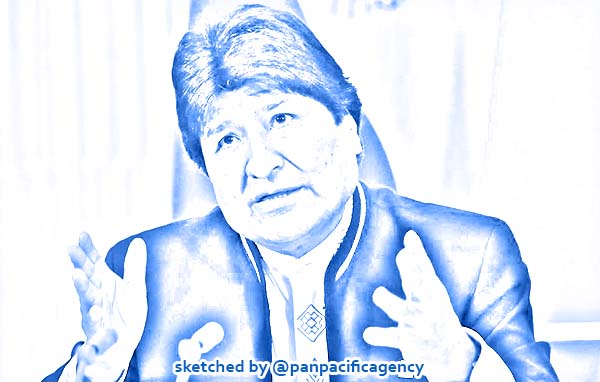Bolivia: narrow win for Evo Morales announced in presidential election

MOSCOW, RUSSIA – JULY 11, 2019: Bolivia's President Evo Morales at a news conference following talks with his Russian counterpart Vladimir Putin (not pictured), at the Moscow Kremlin. Mikhail Metzel/TASS. Sketched by the Pan Pacific Agency.
LA PAZ, Oct 25, 2019, The Guardian. Evo Morales has narrowly won a controversial fourth presidential term just as tens of thousands of Bolivians marched in the administrative capital, La Paz, and cities across the country on the fourth day of protests decrying alleged voter fraud, reported The Guardian.
With 99.99% of the official vote counted, Morales won 47.07%, fractionally clearing the 10-point margin he needed to avoid a second-round run-off against the main opposition candidate, Carlos Mesa, who won 36.51% of the vote.
A spokeswoman for Bolivia’s electoral board said 0.01% votes have been voided in the region of Beni with new voting there scheduled for November. She said they were not enough to change the outcome.
An explosion of protest, a howl of rage – but not a Latin American spring
Read more
The disputed victory will likely stoke tensions in Bolivia after days of protests and angry clashes in towns and cities across the country amid allegations of vote tampering made by the opposition.
In a video message, Mesa accused Morales’ government of orchestrating a “shameful and crude alteration of the result of our vote” and called for peaceful demonstrations to continue indefinitely.
On Thursday the European Union joined calls by the Organisation of American States for a run-off vote to take place even if Morales cleared the 10-point margin, stating it was the “best option … to restore trust and ensure the full respect of the democratic choice of the Bolivian people”.
But on Friday the outcome was welcomed by Mexico. “The government of Mexico congratulates [Morales] for his victory and we wish him the greatest success in his next term,” wrote Maximiliano Reyes Zuniga, Mexico’s deputy foreign minister for Latin America and the Caribbean.
Expressions of concern by international observers came after an unexplained 24-hour pause in reporting official quick count vote results which was followed by a boost in votes for Morales when the count was restarted on Monday.
Manuel González, the head of the OAS election observation team, called it a “drastic and hard-to-explain change in the trend”.
However, Mark Weisbrot, co-director of the Centre for Economic and Policy Research, said the OAS had provided “no evidence – no statistics, numbers, or facts of any kind – to support this idea.” He called it “irresponsible” in the context of post-election violence in Bolivia.
On Wednesday Morales, who prematurely claimed a first-round victory hours after voting ended, angrily accused foreign powers and opponents of a rightwing “coup” plot against him.
Morales, who came to power in 2006 as Bolivia’s first indigenous president, maintained that ballots from remote rural areas, where he has strong support, gave a late boost to his vote tally.